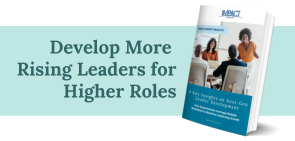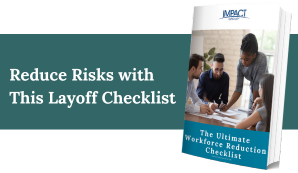Discover and Share
Subscribe to Our Newsletter
SUBSCRIBE NOW
This Week’s Feature

Employee Outplacement: 6 Reasons it Belongs on Your Layoff Checklist
Explore the advantages of promoting employee outplacement services to your departing team members. Employee Outplacement is an Essential Component of Your Layoff Checklist As your organization gears up for layoffs, preparing your layoff checklist and…
View By Topic:
Latest Articles
 Outplacement
Outplacement AI Outplacement Software – HR’s Friend or Foe?
AI outplacement software is transforming how organizations support employees during career transitions. However, despite the rewards of using AI, there are some inherent risks. Without careful implementation and human coaching, AI outplacement tools can fail…
 Leadership Development
Leadership Development How Executive Coaching Benefits Your Organization’s Leaders
Executive coaching benefits company leaders who want to seize business opportunities and overcome organizational challenges such as uncertainty, change, and increasing competition.
 Outplacement
Outplacement Employee Outplacement: 6 Reasons it Belongs on Your Layoff Checklist
Explore the advantages of promoting employee outplacement services to your departing team members. Employee Outplacement is an Essential Component of Your Layoff Checklist As your organization gears up for layoffs, preparing your layoff checklist and…
 Outplacement
Outplacement Corporate Layoff Strategies for Growth and Leadership Revival
While corporate layoffs can lead to financial savings and a more streamlined workforce, they also pose several potential challenges, including falling engagement among remaining employees, post-layoff turnover, and reputational damage. However, while these issues can…
 Leadership Development
Leadership Development Situational Leadership Theory: The Right Leadership Style at the Right Time
Every employee has unique needs to be led and supported at work. This fundamental principle forms the foundation of situational leadership theory—that employees require different forms of leadership at different points along their employee journey,…
 Leadership Development
Leadership Development 5 Ways Bad Leadership Puts Your Company at Risk
Struggling with low engagement, high turnover, or burnout? In this article we’ll address the root cause: bad leadership. Poor leadership creates a toxic work environment, leading to workplace risks and diminished employee retention. We understand the…
 Leadership Development
Leadership Development Leader Development: New Approach Combines Coaching with Online Learning to Boost Retention
While manager behavior remains a key driver of employee turnover, effective leader development stands out as a powerful remedy. Whether employees are “quiet quitting” or formally resigning, company leaders have the power to boost employee…
 Leadership Development
Leadership Development Is MicroCoaching Really the Future of Leader Development?
Microcoaching has emerged as an ideal solution for building and boosting your organization’s leadership capability at scale. For decades, organization’s have relied on executive coaching to develop leaders at the top of the org chart…
 Leadership Development
Leadership Development 3 Surefire Ways to Sabotage the Development of a Coaching Culture
A thriving coaching culture supports the development of strong leaders and a more engaged workforce. However, using coaching only as a remedial solution or limiting it to specific management levels can undermine your efforts. In…
 Leadership Development
Leadership Development The Manager as Coach: How to Walk the Talk
The “manager as coach” phrase may get tossed about at your organization, but has it really taken hold? Has your leadership really put these words into practice? If so, you may have already begun to…
 Leadership Development
Leadership Development Managing Remote Workers: Top 5 Manager Mistakes
Despite the prevalence of remote work over the last few years, many managers struggle with the complexities of managing remote workers. Mistakes such as inconsistent communication and micromanagement underscore the need for manager training and…
 Leadership Development
Leadership Development 6 Biggest Frontline Management Mistakes & How to Avoid Them
Frontline management is challenging, requiring a balance between upper management demands and employee needs. Many frontline managers are promoted because they were successful individual contributors, not for their management skills. In fact, according to Capterra…
 Leadership Development
Leadership Development 4 Reasons Why Company Culture is Important to Your CEO
Here’s why company culture is important & what CHROs can do about it. If you don’t know why company culture is important to your CEO, look at some recent trend data. According to Gartner, a…
 Leadership Development
Leadership Development 3 Ways Executive Career Coaches Improve Company Culture
Executive career coaches deliver a multitude of benefits. They have a higher impact on company culture than you may realize. A recent survey by HRExecutive interviewed 1,100 full-time employees. They found that of the employees…
 Leadership Development
Leadership Development Reimagine Your Talent Strategy: Why Employers Must Invest in Scalable Leadership Development
Is your talent strategy keeping pace with today’s technology-driven, highly competitive business environment? A well-defined talent strategy isn’t just an option – it’s a necessity to address the talent shortage and to control business risks…
Leadership Development
 Leadership Development
Leadership Development How Executive Coaching Benefits Your Organization’s Leaders
Executive coaching benefits company leaders who want to seize business opportunities and overcome organizational challenges such as uncertainty, change, and increasing competition.
 Leadership Development
Leadership Development Situational Leadership Theory: The Right Leadership Style at the Right Time
Every employee has unique needs to be led and supported at work. This fundamental principle forms the foundation of situational leadership theory—that employees require different forms of leadership at different points along their employee journey,…
 Leadership Development
Leadership Development 5 Ways Bad Leadership Puts Your Company at Risk
Struggling with low engagement, high turnover, or burnout? In this article we’ll address the root cause: bad leadership. Poor leadership creates a toxic work environment, leading to workplace risks and diminished employee retention. We understand the…
 Leadership Development
Leadership Development Leader Development: New Approach Combines Coaching with Online Learning to Boost Retention
While manager behavior remains a key driver of employee turnover, effective leader development stands out as a powerful remedy. Whether employees are “quiet quitting” or formally resigning, company leaders have the power to boost employee…
 Leadership Development
Leadership Development Is MicroCoaching Really the Future of Leader Development?
Microcoaching has emerged as an ideal solution for building and boosting your organization’s leadership capability at scale. For decades, organization’s have relied on executive coaching to develop leaders at the top of the org chart…
 Leadership Development
Leadership Development 3 Surefire Ways to Sabotage the Development of a Coaching Culture
A thriving coaching culture supports the development of strong leaders and a more engaged workforce. However, using coaching only as a remedial solution or limiting it to specific management levels can undermine your efforts. In…
 Leadership Development
Leadership Development The Manager as Coach: How to Walk the Talk
The “manager as coach” phrase may get tossed about at your organization, but has it really taken hold? Has your leadership really put these words into practice? If so, you may have already begun to…
 Leadership Development
Leadership Development Managing Remote Workers: Top 5 Manager Mistakes
Despite the prevalence of remote work over the last few years, many managers struggle with the complexities of managing remote workers. Mistakes such as inconsistent communication and micromanagement underscore the need for manager training and…
 Leadership Development
Leadership Development 6 Biggest Frontline Management Mistakes & How to Avoid Them
Frontline management is challenging, requiring a balance between upper management demands and employee needs. Many frontline managers are promoted because they were successful individual contributors, not for their management skills. In fact, according to Capterra…
 Leadership Development
Leadership Development 4 Reasons Why Company Culture is Important to Your CEO
Here’s why company culture is important & what CHROs can do about it. If you don’t know why company culture is important to your CEO, look at some recent trend data. According to Gartner, a…
 Leadership Development
Leadership Development 3 Ways Executive Career Coaches Improve Company Culture
Executive career coaches deliver a multitude of benefits. They have a higher impact on company culture than you may realize. A recent survey by HRExecutive interviewed 1,100 full-time employees. They found that of the employees…
 Leadership Development
Leadership Development Reimagine Your Talent Strategy: Why Employers Must Invest in Scalable Leadership Development
Is your talent strategy keeping pace with today’s technology-driven, highly competitive business environment? A well-defined talent strategy isn’t just an option – it’s a necessity to address the talent shortage and to control business risks…
 Leadership Development
Leadership Development New Manager Skills: How to Develop at Scale
Organizations need to build workplace skills – especially new manager skills. The most scalable and effective solutions for new people managers and functional leaders is combining online learning with microcoaching programs. It’s no secret that…
 Leadership Development
Leadership Development How to Manage Remote Workers & Avoid 5 Common Mistakes
Remote work has been a staple at many organizations for decades. The pandemic made it even more prevalent. Despite its popularity, many leaders still struggle with understanding how to manage remote workers well. Lack of…
 Leadership Development
Leadership Development Which Leadership Traits Matter Most Based on Research?
When it comes to leadership traits in your C-Suite, industry knowledge, intuition, and boldness only get leaders so far. The emotional connection a leader builds with others proves to be of higher value, according to…
Job Relocation
 Job Relocation
Job Relocation Your Relocation Package – Time for a Makeover
The traditional relocation package is getting a makeover! That’s because corporations are determined to attract and retain top talent while taking a more inclusive approach. Competing for talent, retaining star performers and attracting talent to…
 Job Relocation
Job Relocation Duty of Care & Relo: What HR Professionals Need to Know
Duty of Care is a legal term that’s been around for decades. As it relates to employment law, duty of care is the responsibility to act with a reasonable standard of care in regard to…
 Job Relocation
Job Relocation 5 Mistakes in Cross-Cultural Competence Training
Experienced expats identify common mistakes in cross-cultural competence training A vital part of success during global relocations is building cross-cultural competence. The positive effects of cross-cultural training on expatriate assignments are numerous – from building…
 Job Relocation
Job Relocation Mobility Feature: Secret to Profitable, Human-Centered Employee Relocation
Relo EQ is the Future of Employee Relocation Success Before the global pandemic put many moves on a temporary hold, employee relocation was evolving faster than ever. That transformative trajectory will likely continue – even…
 Job Relocation
Job Relocation Corporate Relocation: What is Integration?
In the context of a corporate relocation, what is integration? Multiple moving parts make up a job relocation – from home purchasing/selling to immigration/visa assistance to household goods shipping. Outside of these practical relocation assistance…
 Job Relocation
Job Relocation Corporate Relocations: Maximize Success by Focusing on Wellbeing & Integration Services
Corporate relocations, on average, cost $70,000 – $100,000 (U.S.) per employee. And the cost varies considerably whether or not home ownership is involved. How will your company’s investment in relocation pay off? Experts say much…
 Job Relocation
Job Relocation What is Your Global Mobility Wish?
We love our tradeshow time! We use this opportunity to connect (and reconnect) with our relocation community and get a pulse on what friends, partners, and the industry overall are feeling about global mobility. Last…
 Job Relocation
Job Relocation These Talent Mobility Conversations Failing to Happen?
U.S. companies spend 25 billion dollars every year on corporate relocations. If your company is not part of that statistic, it probably should be. And even if you are already investing in relocations, international assignments,…
 Job Relocation
Job Relocation The Global Assignment was a Success. Now What?
Is repatriation an afterthought at your organization? Global assignments provide a wealth of benefits for companies and employees. From gaining exposure to different cultures to increasing business expertise, transferees are primed to deliver long-term results…
 Job Relocation
Job Relocation Two Questions to Relocation Success
More pay, more experience, more adventure – what more could they want? Unfortunately, decisions as life changing as relocation aren’t typically made in the office by a vote of one. They are made by entire…
 Job Relocation
Job Relocation 5 Moving Tips for Employee Relocation Success!
In talking with relocating employees and spouses, we’ve heard it all – the excitement as well as the fears about moving to the new location, concerns about the kids, anxiety about the spouse’s career. It’s…
 Job Relocation
Job Relocation Attracting the Relocating Employee: Getting to Yes
So you’re in talks with a potential relocating employee. You’re hoping this first-choice candidate accepts the international assignment. But, in a world where employees have a plethora of employment options and companies are scrambling to…
 Job Relocation
Job Relocation Relocation Policy Trends: Have Your Acceptance Rates Tanked?
In the past, employees generally accepted a relocation policy because it was a step forward in their career. However, 56% of relocations are not promotions in our current landscape.1 In addition, relocation benefits are becoming…
 Job Relocation
Job Relocation Mexico to Canada: Overcoming Challenges to Find the Right Position
Culture shock hits in so many ways during international relocations. “It was difficult realizing we had to start a completely new life,” says Jorge Vidal Gutierrez. “Canada and Mexico are very different countries.” The shock…
 Job Relocation
Job Relocation Master Mover Receives Support Even She Couldn’t Find: Sheena’s Story
“I am a master mover! After moving to the US from the UK, I relocated to Texas, Maryland, Virginia, North Carolina, Iowa, and Wisconsin,” says Sheena Pracyk, as she prepares to make another move to…
Outplacement
 Outplacement
Outplacement AI Outplacement Software – HR’s Friend or Foe?
AI outplacement software is transforming how organizations support employees during career transitions. However, despite the rewards of using AI, there are some inherent risks. Without careful implementation and human coaching, AI outplacement tools can fail…
 Outplacement
Outplacement Employee Outplacement: 6 Reasons it Belongs on Your Layoff Checklist
Explore the advantages of promoting employee outplacement services to your departing team members. Employee Outplacement is an Essential Component of Your Layoff Checklist As your organization gears up for layoffs, preparing your layoff checklist and…
 Outplacement
Outplacement Corporate Layoff Strategies for Growth and Leadership Revival
While corporate layoffs can lead to financial savings and a more streamlined workforce, they also pose several potential challenges, including falling engagement among remaining employees, post-layoff turnover, and reputational damage. However, while these issues can…
 Outplacement
Outplacement California WARN Law: How It Affects Smaller Employers & Smaller Layoffs
Have you compared the California WARN law with the federal WARN statute? HR professionals should be reminded that each state has its own regulations affecting layoffs. Whether you employ workers in California or not, the…
 Outplacement
Outplacement Layoff Survior Guilt – What to Do About These 4 Common Reactions
What is Layoff Survivor Guilt? Survivor guilt shows up when people who survived trauma are plagued by “an endless loop of counterfactual thoughts that you could have or should have done otherwise, though in fact,…
 Outplacement
Outplacement RIF Layoff: 3 Strategies for Communicating the News
During a RIF layoff, communicating to staff and other audiences is essential. The rationale and the business reasons for the layoffs should be part of your plan. Your audiences will vary, but these groups should…
 Outplacement
Outplacement Offboarding: Know the 4 Value Drivers of Employee Alumni
How do you measure success in offboarding? Savvy companies today approach offboarding in a “strategic, data-driven and flexible way” according to the Harvard Business Journal. “A well-managed offboarding process can turn employees into loyal alumni who…
 Outplacement
Outplacement Where to Begin: 4 Steps to Consider when Making a Layoff
Making the decision to eliminate positions at your company is never easy. Whatever the reason – merging, downsizing, outsourcing – create a strategic plan that addresses your teams’ questions and aligns with your company’s values,…
 Outplacement
Outplacement What is a RIF?
While some layoffs are temporary, a reduction in force (RIF) is a permanent layoff or an elimination of jobs. RIFs are caused by changes in business strategy, budget cuts, or mergers and acquisitions. Each year,…
 Outplacement
Outplacement How a Reduction in Force (RIF) Effects Your Employer Brand
A reduction in force – and the benefits you offer separated employees – have a major effect on your employer brand. In our online world, company practices and corporate culture are on display for all…
 Outplacement
Outplacement Severance Packages: Best Practices for Employee Exits
A severance package is the combined pay, services and benefits employers sometimes offer employees upon termination. HR leaders look at multiple factors when severing ties with employees and offering severance packages. It’s important to know…
 Outplacement
Outplacement Save Your Brand after a RIF!
Your brand reputation is critical these days. As Dan Coffey, Outplacement Practice Leader at IMPACT Group, puts it, “Building an employment brand has become highly important in today’s economy. When an employee is deciding if…
 Outplacement
Outplacement Next Steps to Avoid Survivor Syndrome
Assess each employee’s readiness for change after a layoff Leading change management can be taxing after a major workforce disruption like a layoff or merger. As a manager, you are vital in helping your remaining…
Coaching
 Coaching
Coaching How to Become a Business Owner with Coaching
In the US, nearly 625,000 new small businesses open each year.* The Bureau of Labor Statistics reports that 10.1% of Americans are self-employed.** As you explore how to become a business owner, you’ll discover that…
 Coaching
Coaching Visa Holder Leverages Power of Networking: Urpi’s Story
Ask a career coach about networking, and 99 out of 100 will tout its importance. This key job search skill becomes even more critical for visa holders as they navigate restrictions and competition to finding…
 Coaching
Coaching The Right Coach at the Right Time: John’s Story
“The emotional piece was the hardest to deal with,” shares John Michelli, whose 28-year career ended when the insurance agency he worked for underwent a reorganization. “It wasn’t just a job – it was my…
 Coaching
Coaching Strategic LinkedIn Project Gains Attention: David’s Story
LinkedIn’s global scale proves especially helpful for job-seeking professionals moving internationally. David Berna was active on LinkedIn prior to relocating from France to Spain, but the guidance he received from his local relocation/career coach offered…
 Coaching
Coaching Strategic Approach Pays Off for Industry Changer: Nicole’s Story
“We left Minnesota for my husband’s dream job in California,” shares Nicole Tinberg. “I had previously moved to the US from the UK – I thought I had moving down! But the relocation was…
 Coaching
Coaching Results Are Only Half of the Reward
Women in industries such as waste services often find it difficult to gain visibility. Elizabeth Csipkay agrees this was a major challenge for her. With expertise in business development, sales and marketing, Elizabeth has proven…
 Coaching
Coaching Relocation is an Open Book: Morgan’s Story
Relocations are full of adjustments, but one adjustment caught Morgan Talbot off guard: winter. “We left 90 degree weather in California to experience the worst New York winter in over a century. That was difficult!”…
 Coaching
Coaching Data Proves Job Seekers Land 2.67 Times Quicker with Job Search Assistance
One-on-One Career Coaching Changes Everything Job searches are no easy task. Whether the individual is relocating or was downsized, they may not know where to begin. One-on-one coaching can change that and provide job search…
 Coaching
Coaching Inner Artist Emerges After Job Loss: Cynthia’s Story
A Case Study About Finding a New Path After a Job Loss From an early age, Cynthia Brinson took an interest in using her imagination and her hands. “From cooking, sewing, and gardening as a…
 Coaching
Coaching Customer Stories: Tripti Someshwar
A story of career rediscovery. Relocations can be the perfect time to rediscover yourself. “My move to Hong Kong launched the opportunity for me to advocate for others. I am connecting my legal background with…
 Coaching
Coaching Customer Stories: Jenette Purcell
Jenette Purcell’s long-standing career in accounting and administration seemed like the right fit. She had gained valuable experience in bookkeeping, accounts payable, and payroll, and she was good at it. During her time with her…
 Coaching
Coaching Customer Stories: Evelina Cohn
The Cohns recently planted fruit trees on their acre of land in the countryside of Virginia. Soon chickens will join the family. “It is beautiful here. We enjoy the view”, says Evelina Cohn. When we…
 Coaching
Coaching Corporate IT to Youth Education Takes a Leap of Faith: Leah’s Story
When Leah Phelps started her job search, she was done with corporate environments. “I was tired of the rat race and the stress. My former company went through a few layoffs. I was there 25…
 Coaching
Coaching 4 Reasons Why a Robot Shouldn’t Replace This Job
In our high-tech world, it’s easy to eliminate the human touch from almost everything – favoring artificial intelligence and automation in the quest for efficiency and cost savings. This is happening in the career coaching…
 Coaching
Coaching Bonding Over Hockey Leads to Winning Plays for Job Search: Chris’ Story
As a senior-level manager in information security, Chris LaBuda felt confident he could navigate his job search solo as he and his family relocated to Georgia. “I thought there would be multiple opportunities for me…
Subscribe to Our Newsletter
SUBSCRIBE NOW




